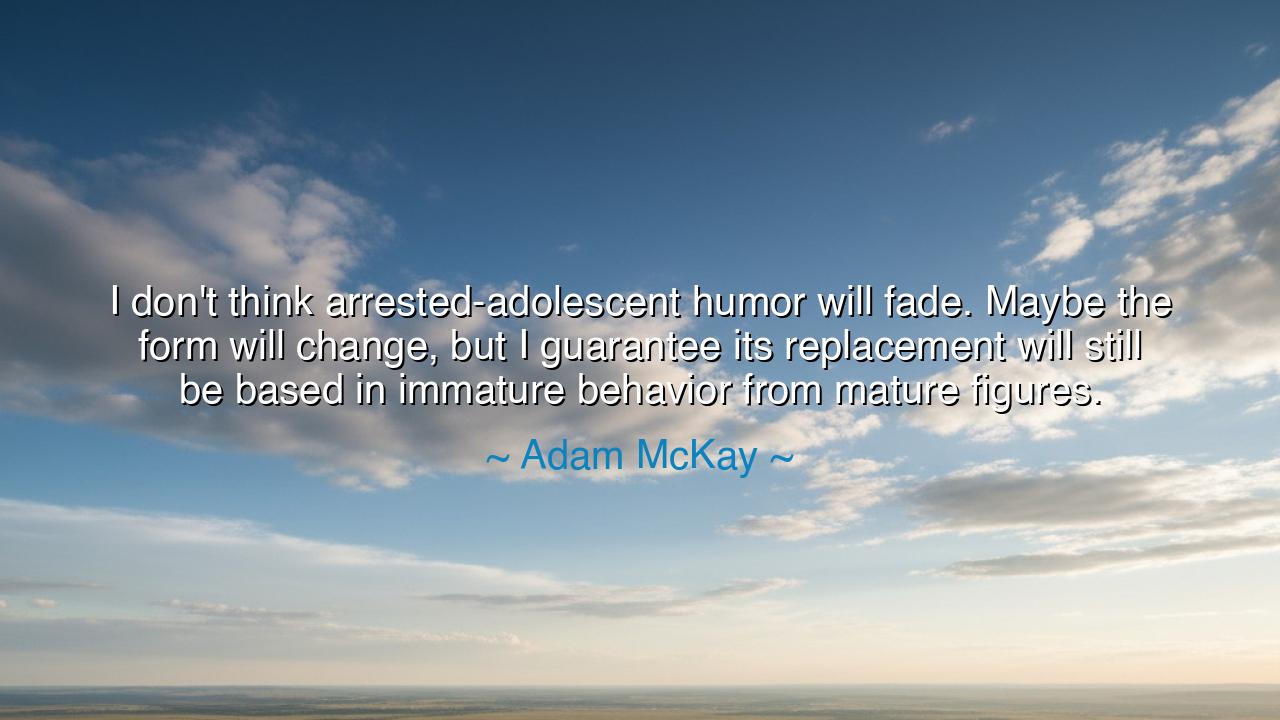
I don't think arrested-adolescent humor will fade. Maybe the form
I don't think arrested-adolescent humor will fade. Maybe the form will change, but I guarantee its replacement will still be based in immature behavior from mature figures.






Hear the words of Adam McKay, the modern satirist and storyteller of the absurd, who declared: “I don’t think arrested-adolescent humor will fade. Maybe the form will change, but I guarantee its replacement will still be based in immature behavior from mature figures.” Though spoken in jest, these words carry the weight of an eternal truth about the heart of humanity—that within every grown man and woman lives the restless child, ever reaching, ever laughing, ever rebelling against the solemn mask of adulthood. For humor, in its essence, is not the opposite of wisdom, but its companion; it is how the wise remind themselves that all grandeur is fleeting and that even kings are fools beneath their crowns.
In this saying, McKay speaks as both philosopher and jester. He recognizes that arrested-adolescent humor—the laughter born from mischief, embarrassment, and folly—is not a passing fad, but an ancient pulse. From the courts of emperors to the screens of our time, the spectacle of mature figures behaving immaturely has always delighted the crowd. Why? Because it unmasks the pretense of perfection. It reveals that no matter how wise, how powerful, how composed we pretend to be, we remain creatures of desire, confusion, and error. The laughter that erupts when we see the mighty stumble or the serious lose control is not cruelty—it is catharsis. It is the soul whispering, “See, even the gods are human.”
The ancients knew this well. In the festivals of Dionysus, when Athens crowned its poets with laurel and called upon the muses, they also invited the fools. The stage would show kings arguing like children, priests behaving like gluttons, and philosophers caught in absurdities. The people laughed, not to mock virtue, but to honor truth. They understood that comedy and immaturity were sacred tools for revealing the hidden cracks in pride. What Adam McKay calls “immature behavior” was, to the ancients, a mirror of mortality—a reminder that wisdom without humility becomes hypocrisy.
Consider the tale of King David in the scriptures. Though revered as a man after God’s own heart, he once danced wildly before the Ark of the Covenant, leaping and whirling like a child, while his wife looked on in scorn. Yet David replied, “I will be yet more undignified than this.” In that act of joyful immaturity, he showed the deepest truth of leadership—not solemnity, but sincerity. So too does McKay’s insight ring true: when those who are mature dare to act with the innocence of youth, when they risk appearing foolish, they touch something divine. It is the courage to be unmasked, to play, to laugh, that keeps the human spirit alive.
Arrested-adolescent humor, then, is not the disease of immaturity—it is the cure for pretension. It is the energy that keeps art alive and leaders humble. Without it, life calcifies into performance. The man who cannot laugh at his own absurdity becomes the tyrant; the society that cannot laugh at itself drifts toward fanaticism. McKay, who has made films exposing both the ridiculous and the profound, understands that laughter at immaturity is not regression—it is revelation. It is how we cleanse the soul of its arrogance and remind the intellect of its limits.
Let us not mistake childishness for corruption of character. There is a difference between the cruelty of the fool and the purity of the playful. To act with humor is to embrace imperfection without fear. The mature who dare to be “immature” in this sense are not losing wisdom—they are preserving wonder. The fool who knows he is a fool is often wiser than the sage who forgets how to laugh. As Adam McKay teaches, even as times change, this form of comedy will never vanish, for it is tied to the rhythm of the human heart itself.
So, take this lesson, O listener, and carry it as a torch against the darkness of pride: do not outgrow laughter. Laugh at yourself, at your stumbles and your pretensions. Laugh when power takes itself too seriously. Laugh when the world grows heavy, for laughter is the rebellion of the soul against despair. The wise man who can laugh is greater than the proud man who cannot. For when the mature embrace their inner child, the world becomes lighter, truer, and more human. Thus, as McKay foretold, the forms of humor may change with time, but its essence will remain—the eternal dance of maturity and mischief, where wisdom smiles through the mask of foolishness and the heart, for one golden moment, becomes free.






AAdministratorAdministrator
Welcome, honored guests. Please leave a comment, we will respond soon